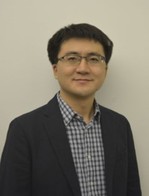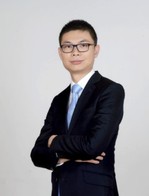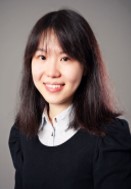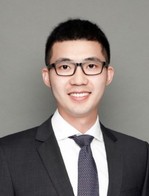In order to better achieve the mission of School of Entrepreneurship and Management which is to nurture the managerial talents to serve the real economy, and to launch top-notch innovators into successful entrepreneurs, also to make greater breakthroughs on scientific research and teaching, SEM decided to hire 5 PhD scholars as Assistant Professors.
 Jianfeng Xu graduated from Fudan University (China) in 1983 with a bachelor’s degree in Life Science. He ran his business from 2005 to 2009. He received master’s degrees in Mathematics and Economics from University of Toledo (US) in 2012. He is now pursuing his Ph.D. in economics at University of Illinois at Urbana-Champaign (expecting to graduate in 2018). His research interests are Labor Economics, Development Economics, Behavioral Economics and Economics of Education.
Jianfeng Xu graduated from Fudan University (China) in 1983 with a bachelor’s degree in Life Science. He ran his business from 2005 to 2009. He received master’s degrees in Mathematics and Economics from University of Toledo (US) in 2012. He is now pursuing his Ph.D. in economics at University of Illinois at Urbana-Champaign (expecting to graduate in 2018). His research interests are Labor Economics, Development Economics, Behavioral Economics and Economics of Education.
Through the first chapter of his dissertation “Statistical Discrimination, Taste-based Bias, and Cognitive Bias --- Analyzing Grading Bias Caused by Handwriting Quality in a Randomized Control Trial”, he brings the topic of handwriting into economics. This paper is the first to quantitatively estimate the grading bias caused by handwriting quality through an RCT, with the finding that this bias is a discrimination that influences at least 3.8% of students’ ZhongKao admission outcomes. Additional experiments show that the major mechanism of this bias is neither statistical discrimination nor taste-based bias, but cognitive bias. His second chapter builds a census dataset of all the students in one county of China and investigates the influences of school starting age on students’ test scores, leadership, and non-cognitive skills. This paper quantitatively estimates the negative effect of early entry to schooling on children’s academic performance and personality. These two papers will be submitted to top field journals.

Chen He received his MSc in Economics in 2014, and BSc (Cum laude) in Economics in 2012, both from Tilburg University (Netherlands). Since 2014, he is pursuing his Ph.D. in Economics at Tilburg University (expect to graduate in 2018). His research interests are empirical industrial organization, structural econometrics, applied microeconomics and quantitative marketing.
Chen He’s job market paper, “Optimizing Online Sales using Targeted Advertising”, studies how reallocating advertising budgets can increase online sales. He finds empirical evidence that advertising does not only causally increase online traffic but also causally increase online conversion rates. He then proposes and estimates a new integrated model of consideration and conversion using high frequency data. Based on the model estimates, he shows that shifting advertising across channels could lead to increased sales.
In the paper “Advertising as a Reminder: Evidence from the Dutch State Lottery”(joint with Tobias Klein), Chen He studies the dynamic effects of advertising. The central idea is that advertisements can also remind consumers to buy. Motivated by this, they develop a tractable dynamic structural model of consumer behavior. Based on the model estimates, they show that shifting advertising expenditures to the days before the draw could be a strategy to increase sales for a given advertising budget.
 Wei Si holds a B.A. in Finance from Tianjin University of Finance and Economics (China) in 2010, and an M.Sc. in Economics from Dalarna University (Sweden) in 2012. Since 2012, she is pursuing her PhD in Economics at Stockholm University (Sweden), and is expected to receive the degree in May 2018. Her research interests include Labor Economics, Development Economics, Applied Microeconometrics, and Policy Evaluation.
Wei Si holds a B.A. in Finance from Tianjin University of Finance and Economics (China) in 2010, and an M.Sc. in Economics from Dalarna University (Sweden) in 2012. Since 2012, she is pursuing her PhD in Economics at Stockholm University (Sweden), and is expected to receive the degree in May 2018. Her research interests include Labor Economics, Development Economics, Applied Microeconometrics, and Policy Evaluation.
In her job market paper, “Diverse Expertise, Peer Effects, and Research Productivity: Does diversity in idea space matter?”, Wei empirically explores whether the cognitive distance between collaborators affects peer effects and productivity in creating knowledge. The findings suggest that both knowledge spillovers and skill complementarity play a role in collaborations. Upon losing a collaborator, the loss of an irreplaceable source of ideas seems to have a more adverse impact on a scientist’s productivity than the potentially imperfect skill substitution

Long Wang received a bachelor’s degree of double majors in Mathematics and Economics in 2010 and a master’s degree in Economics in 2013 from Southwestern University of Finance and Economics (China). Since 2013, he is pursuing his PhD in Real Estate in National University of Singapore (estimated to be conferred the degree in July 2018). His research interest includes Real Estate Finance, Applied Econometrics, Chinese Economy and Big Data.
His dissertation, “Information Asymmetry and Political Connection: Evidence from Global Real Estate Investments”, aims to examine issues of information asymmetries between foreign and domestic investors in global real estate investments, and more specifically, in China’s land auction exercises, to test if the political connection exists in State-Owned Enterprises (SOEs). Specifically, his job market paper looks into investors’ learning from historical acquisitions, and explores the channels through which investors resolve information immobility in global commercial real estate investments. The second essay examines both the information and non-information channels that possibly explain the negative corruption-investment relationship in the macro context. The third essay investigates the price premiums paid by SOEs and individuals in China land auctions, and then explores the underlying mechanisms explaining the price premiums. All the three papers are currently under review in finance and economic journals.
He has three additional working papers on finance topics regarding the spillovers of non-fundamental risk in the stock market, the international stock price synchronicity issue, and the effect of establishing REITs on global real estate investments.
 Soo Jin Kim (Korean) obtained her Bachelor’s degree in Economics from Ewha Womans University (Korea) in 2011 and Master’s degree in Economics from Seoul National University (Korea) in 2013. Since 2013, she is doing her PhD in Economics in Michigan State University (US), estimated to be diplomed in 2018. Her research interests are Industrial Organization (Theory & Empirical), Applied Microeconomics, Business Economics and Competition Policy Analysis."
Soo Jin Kim (Korean) obtained her Bachelor’s degree in Economics from Ewha Womans University (Korea) in 2011 and Master’s degree in Economics from Seoul National University (Korea) in 2013. Since 2013, she is doing her PhD in Economics in Michigan State University (US), estimated to be diplomed in 2018. Her research interests are Industrial Organization (Theory & Empirical), Applied Microeconomics, Business Economics and Competition Policy Analysis."
Her doctoral dissertation consists of three essays on Internet economics. In her job market paper entitled "Privacy, Information Acquisition, and Market Competition", Kim examines how personal information affects market outcomes in a two-sided market where sellers target advertisements to individuals who have varying privacy concerns. She finds that an entrant firm is disproportionately affected by consumers' privacy concerns. Privacy concerns and the resulting market outcomes may lower consumer surplus and social welfare. The second essay uses a model of two-sided market to show how zero-rating for on-line content leads to vertical content foreclosure. The third essay explores how peering agreement in the Internet backbone industry affects various investment.
The joining of these five new assistant professors will significantly broaden SEM’s research area in Real Estate, E-commerce, Marketing, Industrial Organization, Economics of Education, Experimental Economics and Behavioral Economics. It will strengthen SEM’s academic research capacity and enrich its intellectual environment in its pursuit to become one of the world's premier entrepreneurship management school in the near future.




